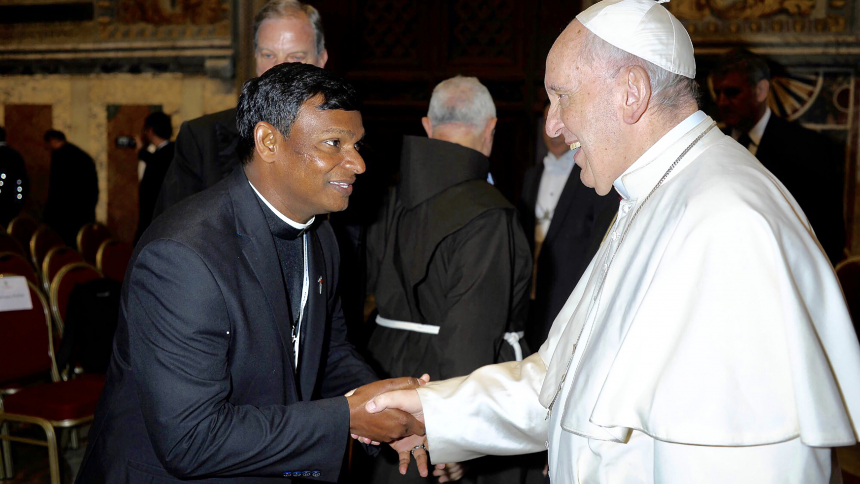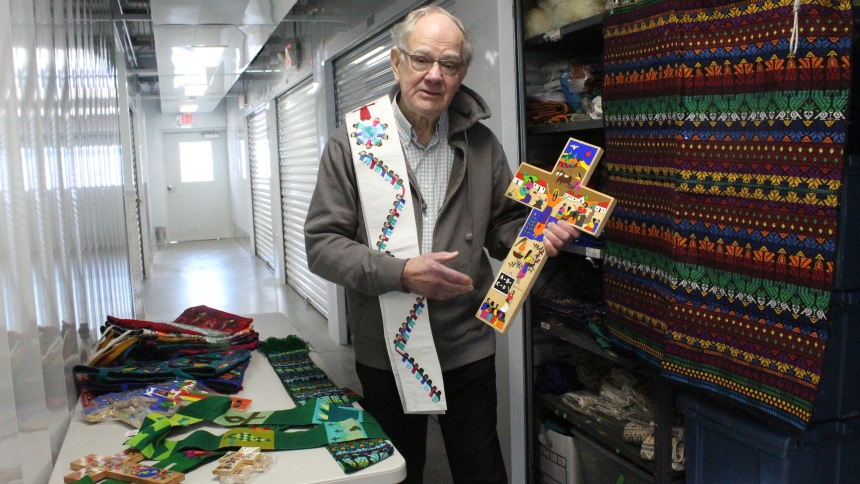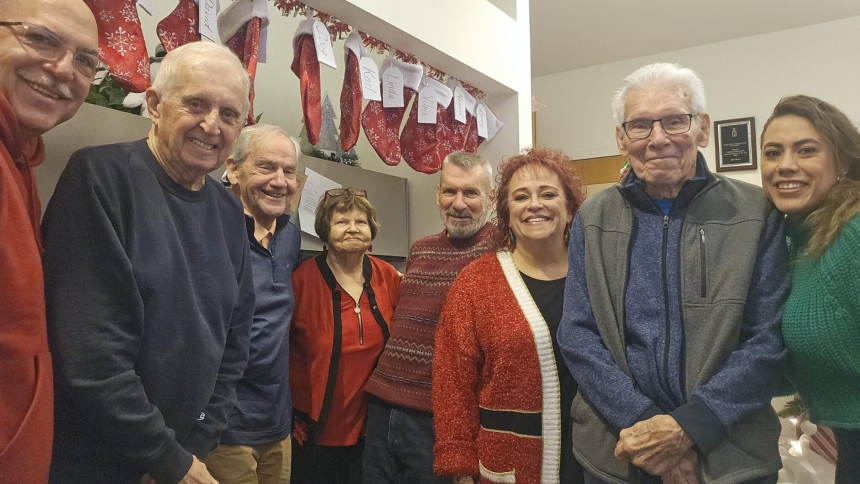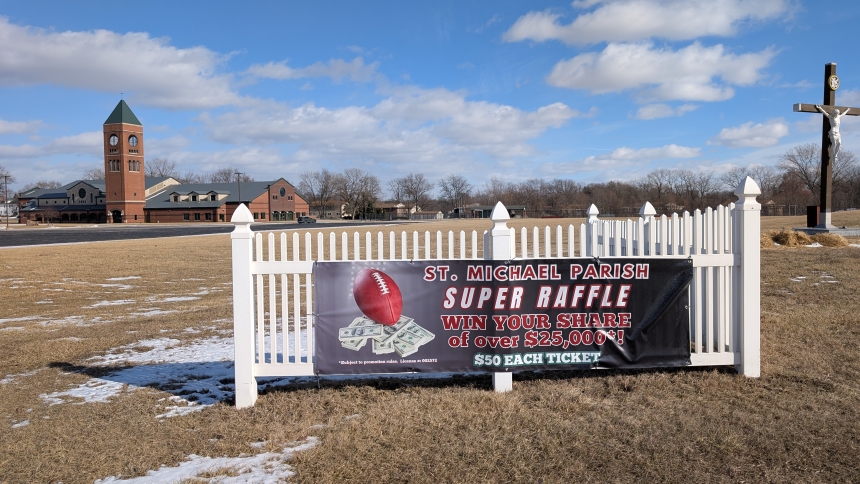
WHITING – It’s not unusual for a memorable concert to result in an encore or a popular stage play to earn a standing ovation, but the Missionaries of Mercy may have reached an unprecedented success by being held over for seven years running with no end in sight.
First appointed by Pope Francis to serve during the 2016 Jubilee Year of Mercy, the 800 priests from around the world were tasked with elevating the Sacrament of Reconciliation by making confession more available to Catholics. Later, the pontiff decided to prolong their service given the many testimonies of conversion attributed to their special ministry, according to the Vatican News.
Of the original 100 Missionaries of Mercy in the U.S., about 50 remain, and 40 of them gathered for the Third National Gathering of the Missionaries of Mercy USA and Canada hosted from April 24 through 27 by St. Meinrad Seminary and School of Theology near Evansville.
Among those attending was Father Jayababu Nuthulapati, the only remaining Missionary of Mercy in the Diocese of Gary and administrator of Sacred Heart in Whiting since 2018. A native of India ordained in 2006, Father Nuthulapati arrived in the diocese as a member of the Missionaries of the Precious Blood community, but was incardinated last August as a diocesan priest after having become a U.S. citizen on June 10, 2022.
“I took the opportunity to learn more about the current National Eucharistic Revival at the recent conference in St. Meinrad from Bishop Andrew H. Cozzens of the Diocese of Crookston (Minnesota), the leader of the revival as chairman of the U.S. Conference of Catholic Bishops Committee on Evangelization and Catechesis,” explained Father Nuthulapati.
“The most important aspect of being a Missionary of Mercy is to bring God’s unconditional mercy to his people,” Father Nuthulapati said. “Pope Francis says that God’s mercy is an eternal spring.
“Just as we come to bring the Word of God to everyone through our ministry, we bring forgiveness to the people of God,” he added.
In addition to being with Bishop Cozzens, the Missionaries of Mercy from the U.S. and Canada were greeted by Archbishop Charles C. Thompson of the Archdiocese of Indianapolis, who welcomed his guests and offered a Mass with them. There were talks about Divine Mercy, how to catechize the laity and events at the Vatican, including information about Pope Francis declaring 2025 as the Year of Hope. “In the midst of the darkness, suffering, war in Ukraine, inflation, violence and climate change concerns, we are looking up to the Cross, like the people in the desert looked to God,” Father Nuthulapati said.
“Bishop Cozzens anointed us to serve as confessors at the National Eucharistic Revival conference next July in Indianapolis and offered us accommodations,” he added.
“It was so beautiful to be in that brotherly fraternity,” he added. “They were so kind and so loving to me, the only foreign-born priest, very encouraging and supportive. I saw the really tender mercy of God at the conference.”
In 2018, when the Missionaries of Mercy met in Rome, Pope Francis gave each of them, including Father Nuthulapati, “a bronze plaque of the Prodigal Son kneeling in front of his father, who embraced him to express his mercy. It is very beautiful.” He looks forward to being summoned to the next biannual conference at the Vatican next year after Easter for a four-day retreat and outdoor celebration of the Divine Mercy.
“We will meet one-on-one with the Pope, share two Masses with him, and attend lectures by cardinals, bishops and the Dicastery of Rome concerning our continued work,” Father Nuthulapati said. “Then in 2025, we are invited (again) to Rome when the Pope will open the doors to the Year of Hope.”
Commissioned by the pope “to be in every corner of the world, bringing reconciliation and forgiveness,” Father Nuthulapati explained that the Missionaries of Mercy were granted the ability to forgive “a few sins so grievous that they are (normally) reserved only for the Vatican. Commonly, a man or woman would have to go to confession in Rome, but realizing the unavailability of that requirement and the availability of the mercy of God,” the Missionaries of Mercy can forgive those sins, which Father Nuthulapati revealed to be:
1) The defiling of the Eucharist, either by spitting it out or using it in a Satanic ritual;
2) Attempting to assassinate the Pope;
3) A priest breaking the seal of confession by revealing details about a repentant sinner;
4) A priest offering absolution to his own sexual partner; and
5) Participating in an abortion, even by paying for it, and later seeking to become a priest.
Before the COVID-19 pandemic, Father Nuthulapati had been assigned to mission churches in California, but after arriving in Northwest Indiana, he encountered the quarantine that affected churches, schools and businesses. Since many hospital chaplains are senior priests who were at high risk for the coronavirus, Father Nuthulapati took over visiting patients at St. Catherine Hospital in East Chicago, Community Hospital in Munster and Franciscan Health in Munster and Dyer, “where I saw the full aspects of the Works of Mercy in action. It was a beautiful ministry that I really loved.
“I was available during the peak months and years, and I never got COVID until just this past March, but I am fully vaccinated, and it lasted just five days,” he said.
For those interested in counseling, confession or information about the Sacrament of Reconciliation, Father Nuthulapati is available at jayacpps@gmail.com or by calling his parish office at 659-0733.



